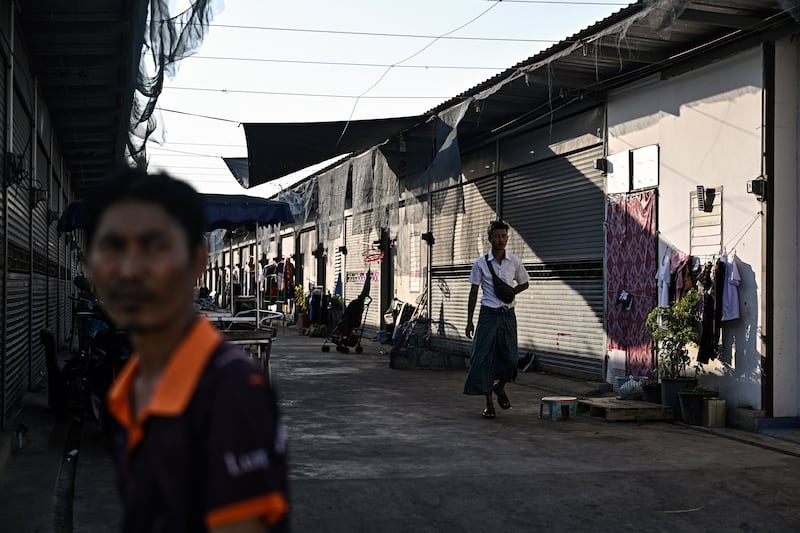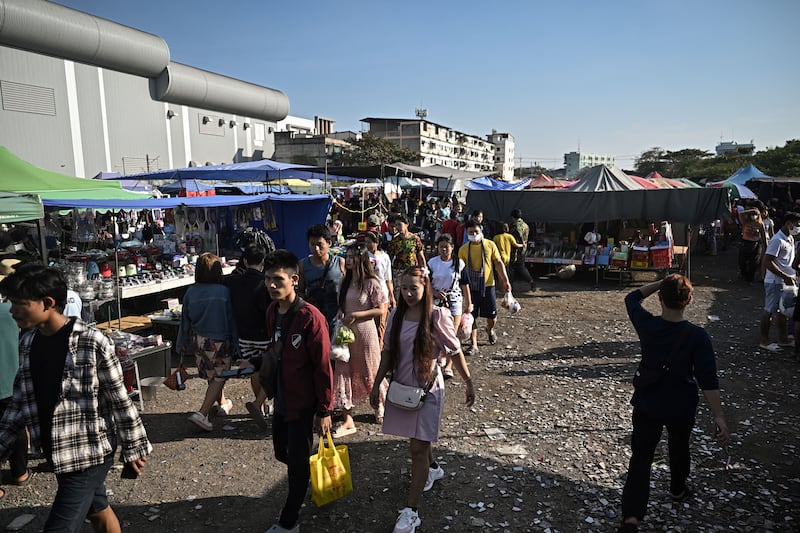MAE SOT, Thailand – Thailand’s latest labor documentation rule requiring Myanmar government approval has raised concern among migrant worker advocates, who warn the policy could expose millions of Myanmar workers to conscription risks from their country’s military regime.
Thai lawmakers periodically change the procedure to enable migrant workers – both new arrivals applying for the first time and those already in the country – to get the documents they need to work legally.
The new process requires Thai employers or agents to “prepare documents for submission to Myanmar officials” for their employees from Myanmar and would require their embassy in Bangkok to “examine and endorse” the documents, according to Thailand’s Department of Employment.
But migrant worker advocates believe involving the Myanmar embassy is unnecessary and effectively gives the junta veto power over workers, which could give those who fled their war-torn country little choice but to go home to the risk of conscription and repression.
The result could be that Myanmar migrant workers in Thailand give up efforts to get legally registered.
“Most people who are opting to stay outside of the system are doing so because they are fearful of repercussions from the Burmese government, either to themselves and their families,” said Brahm Press, director of the Migrant Assistance Program, referring to Myanmar.
“Especially people who have been escaping conscription, anyone who was part of the People’s Defense Forces or the Civil Disobedience Movement,” he added, referring to anti-junta militias and a protest campaign by civil workers who quit their jobs to protest against a military coup four years ago.

After the Myanmar military enacted conscription laws in early 2024, tens of thousands of people flooded into Thailand in a matter of months, both in search of better economic opportunities and to escape being arrested and forced to fight in a war against those trying to end military rule.
More than 21,000 political prisoners have been detained by the junta since the 2021 coup, according to the Assistance Association for Political Prisoners.
Radio Free Asia tried to telephone Somchai Morakotsriwan, Thailand’s director general of the Job Employment Department, for more information on the new rules for Myanmar migrant workers but he did not respond by the time of publication.
Workers in the lurch
As many as 3,000 workers in Mae Sot, a western Thai district on the Myanmar border, are expected to choose not to complete the first registration step in order to protect their identity from the junta by a Feb. 13 deadline despite the drawbacks, according to the Yaung Chi Oo Workers’ Association, which helps Myanmar nationals working on the border.
But being undocumented has big drawbacks for workers, said the association’s joint secretary, Moe Kyaw.
“When they get injured, when they are sick, they have no access to the social security fund. And also their right to travel is limited without legal documents – they can’t travel to other provinces,” he added. “They are not allowed to open or create bank accounts, they can’t get a driver’s license.”
Press of the Migrant Assistance Program also pointed to the risks.
“Leaving populations undocumented, with little access to formal services like healthcare, can lead to increases in malaria, tuberculosis and other communicable diseases,” Press said.
“With more of this invisible population circulating, I think that there will be some effects, because people won’t have access to health services, the health system, testing – they’ll be scared to expose themselves.”

Growing pressure
The new Thai regulation is the latest action by Thailand to make life more complicated for Myanmar workers, which migrants and rights activists say bolsters the junta’s effort to get young people home to join the military.
In July, Thailand closed seven offices issuing identity documents for Myanmar migrants, forcing them to use their embassy to complete the paperwork instead, and thereby giving the embassy the power to block people from Thai employment.
Myanmar’s exiled parallel National Unity Government has called on Thailand to end the junta’s growing control of its overseas workers.
In Myanmar, the military regime has also placed further restrictions on its workers trying to go overseas, while squeezing those already abroad for desperately needed foreign income to support a tanking Myanmar economy.
In January, Myanmar’s Ministry of Labor required agencies sending workers overseas to ensure their Thai employers agree that migrant workers can be sent home to serve in the military, and later that month, the ministry changed its rules to prevent men of enlistment age from signing contracts with agencies sending workers abroad.
RELATED STORIES
Tide of Myanmar war refugees tests Thailand’s welcome mat for migrants
Myanmar junta can order migrant workers home to fight, agency says
Thailand to grant citizenship to nearly 500,000 people
Myanmar workers in Laos and Thailand who register with the Myanmar embassy are also required to pay mandatory remittances through junta-owned banks as well as taxes, which workers say they are reluctant to pay.
Thailand needs migrant workers for its growing economy and is wary of chaos in its western neighbor, with which it shares a 2,400-kilometer (1,500 miles) border.
Thai political analyst and former government adviser Panitan Wattanayagorn said he suspected the Myanmar junta was pressing Thailand to support its polices.
“Thai officials here are also under the pressure to work more with the government of Myanmar,” said Panitan.
“I think that the pressure is official from the labor department of Myanmar to our labor department and also maybe indirect pressure from the agencies that are working for the Myanmar government, so they may apply pressure to the different channels.”
Edited by Taejun Kang.
